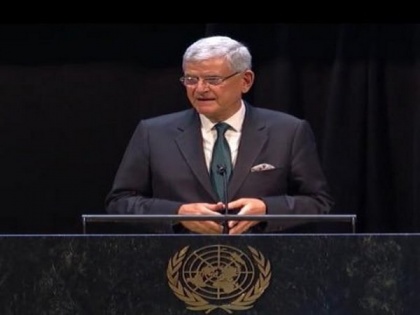UNGA President calls for halt to nuclear tests
By ANI | Published: September 9, 2021 10:43 PM2021-09-09T22:43:18+5:302021-09-09T22:50:13+5:30
The President of the UN General Assembly, Volkan Bozkir, on Wednesday called for an end to nuclear tests, saying these tests have long lasting health and environmental consequences

UNGA President calls for halt to nuclear tests
The President of the UN General Assembly, Volkan Bozkir, on Wednesday called for an end to nuclear tests, saying these tests have long lasting health and environmental consequences
Despite recent developments in advancing nuclear disarmament, more remains to be done, said Bozkir, urging countries that have yet to sign or ratify the Comprehensive Nuclear-Test-Ban Treaty (CTBT) to do so without delay.
"More than 2,000 nuclear tests have been conducted since the advent of nuclear weapons. While the rate of testing has declined, they have not stopped," he said.
"These tests have long-lasting health and environmental consequences. They devastate the communities they impact. They displace families from their homelands."
Underlining the General Assembly's commitment to nuclear disarmament, Bozkir welcomed progress achieved over the past year amid the challenges of the COVID-19 pandemic.
The Treaty on the Prohibition of Nuclear Weapons, adopted in 2017, entered into force this past January after securing the required 50 ratifications.
The United States and Russia also extended their nuclear arms reduction agreement, known as the New START Treaty, for an additional five years through February 2026.
However, he stressed that more needs to be done, including arranging meetings to review the Non-Proliferation Treaty, which must be held no later than February 2022, and convening the Fourth Conference of Nuclear-Weapon-Free Zones and Mongolia, postponed since April 2020.
Bozkir also called for action to advance the CTBT, adopted in 1996, which bans all explosive nuclear weapons tests anywhere and by any nation.
The treaty has been signed by 185 countries and ratified by 170, including three nuclear-weapon States. However, it must be signed and ratified by 44 specific nuclear technology holder countries before it can enter into force.
( With inputs from ANI )
Disclaimer: This post has been auto-published from an agency feed without any modifications to the text and has not been reviewed by an editor
Open in app